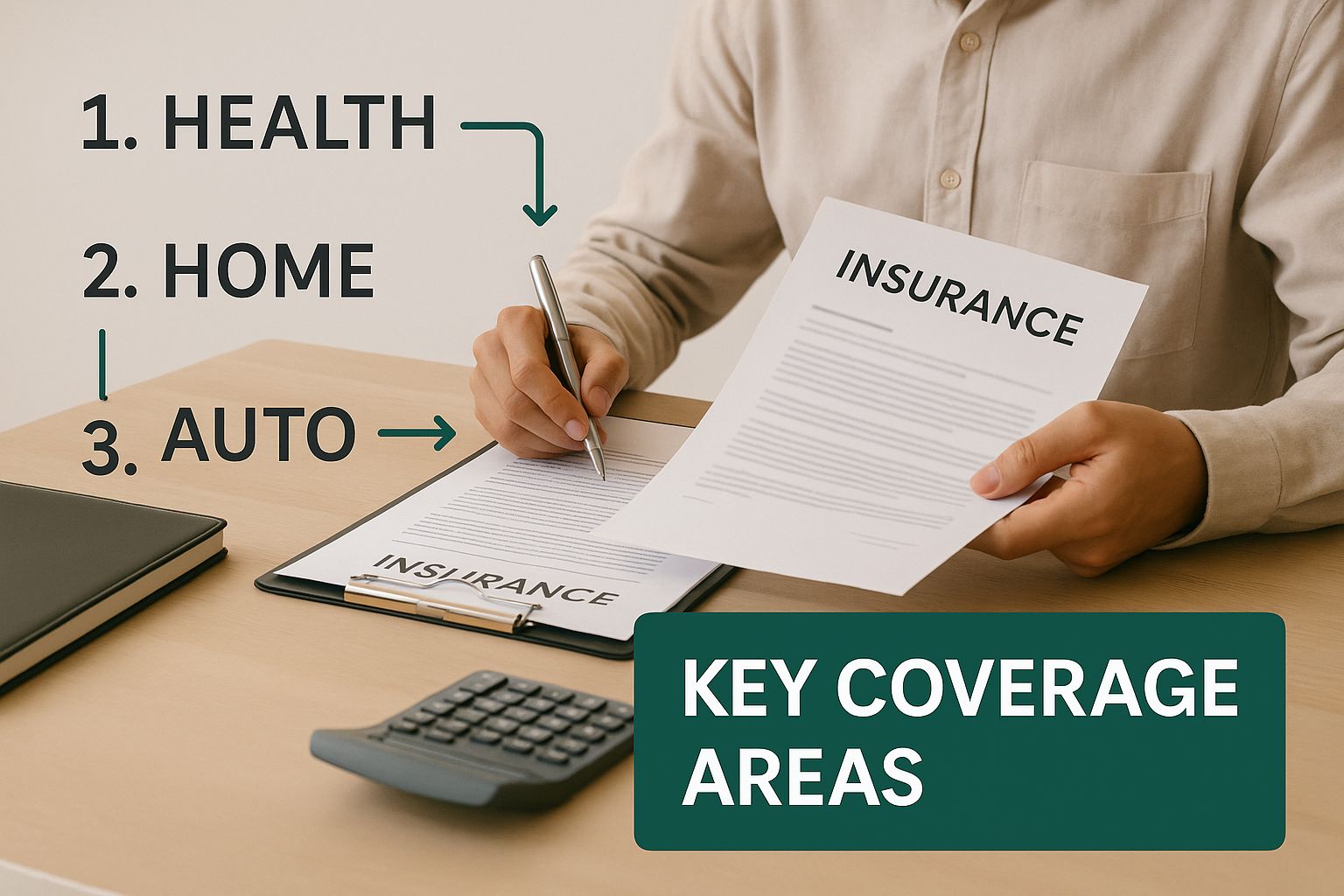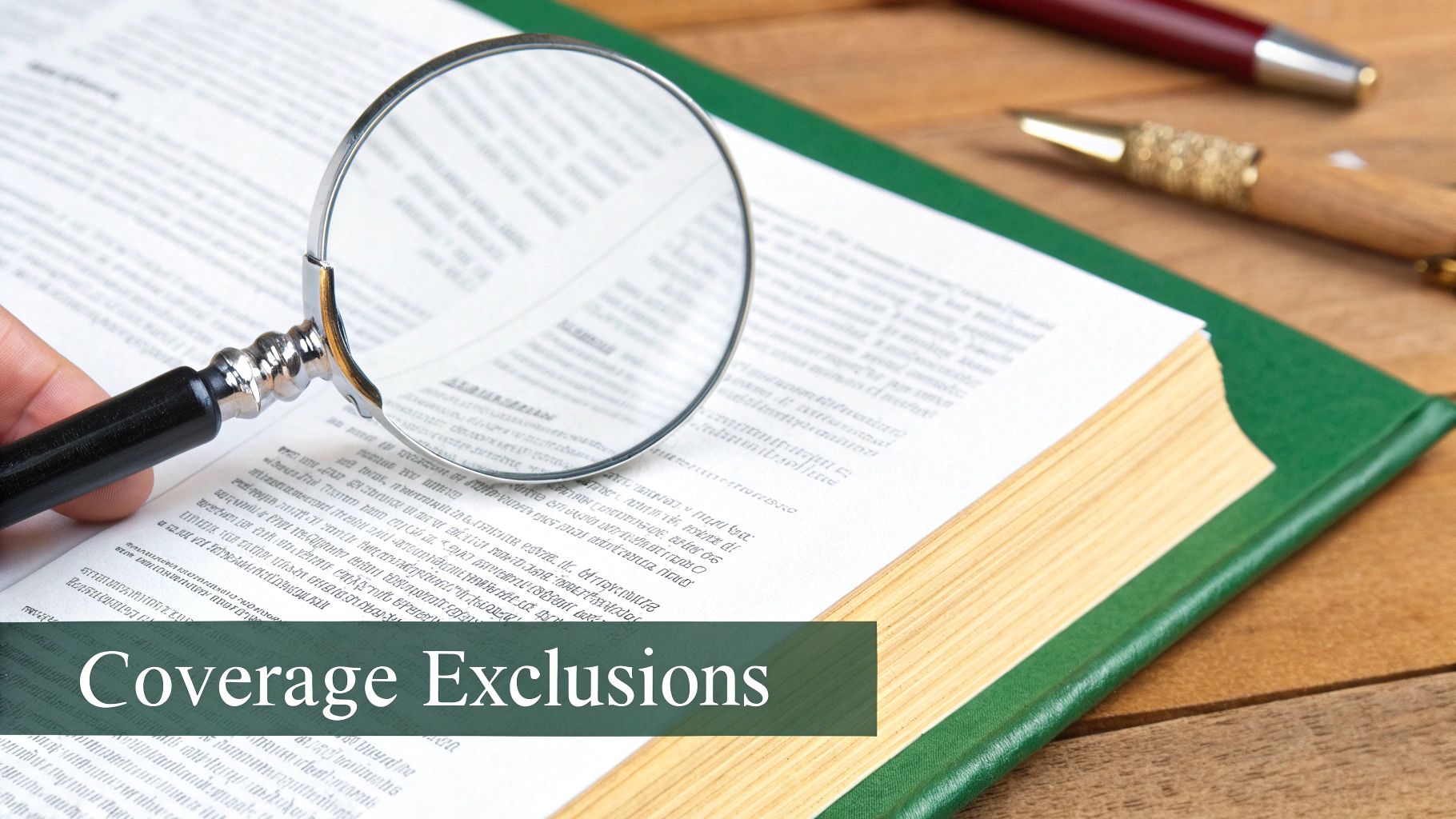Think of umbrella insurance as a financial bodyguard. It's the extra layer of liability protection that steps in when your regular homeowners or auto insurance just isn't enough. It's designed to shield your assets and future earnings from the kind of massive lawsuit that could otherwise wipe you out financially.
What Is Umbrella Insurance and Why Is It So Important?
Your standard insurance policies are your first line of defense. They handle the everyday risks up to a specific dollar amount. But what happens if a serious car crash or an accident on your property leads to a lawsuit that blows past those limits?
That's exactly where an umbrella policy comes into play.
It’s an extra policy that sits "over" your existing ones. Once a claim maxes out your primary auto or home coverage, your umbrella insurance activates to pay the remaining amount, all the way up to its own, much higher limit.
Who Really Needs an Umbrella Policy?
You don't have to be a millionaire to need this. Umbrella insurance is a smart move for almost anyone with assets to protect. You should seriously consider it if you:
- Own a home: A guest could have a bad fall on your property, leading to a huge lawsuit.
- Have teenage drivers: Let's face it, inexperienced drivers significantly increase the risk of a major accident.
- Own a pool or trampoline: In the insurance world, these are "attractive nuisances" that dramatically increase your liability risk.
- Frequently host parties or gatherings: The more people you have over, the higher the odds of something going wrong.
The bottom line is this: if a lawsuit could threaten your savings, your home, or your future income, this coverage is critical. A great starting point is figuring out how much umbrella insurance you might need to fully cover your financial exposure.
To see how this works in the real world, here’s a quick look at common scenarios where an umbrella policy becomes a financial lifesaver.
Quick Guide to Umbrella Insurance Coverage
| Scenario | Standard Policy Limit Reached | How Umbrella Insurance Protects You |
|---|---|---|
| Serious Car Accident | Your auto liability limit of $300,000 is exhausted by medical bills and legal fees from a multi-car pile-up you caused. | The court awards the injured parties $1 million. Your umbrella policy covers the remaining $700,000. |
| Dog Bite Incident | Your dog bites a visitor, and your $100,000 homeowners liability limit is used up for initial medical treatment. | The visitor sues for pain, suffering, and lost wages, winning a $500,000 judgment. Your umbrella policy pays the extra $400,000. |
| Pool Accident | A guest is seriously injured in your swimming pool, and the $500,000 liability limit on your home policy is quickly met. | A lawsuit results in a $1.5 million settlement. Your umbrella policy kicks in to cover the remaining $1 million, protecting your home and savings. |
| Slander/Libel Claim | You post a negative online review that leads to a defamation lawsuit. This is often excluded from standard policies. | Your umbrella policy may offer broader coverage for personal injury, helping to pay for legal defense and a potential settlement. |
As you can see, the umbrella policy is the crucial backstop that prevents a personal catastrophe from becoming a financial one.
An umbrella policy isn't just about protecting what you have now; it's about safeguarding your future. A significant judgment can lead to wage garnishment, putting your future earnings at risk for years to come.
For a surprisingly small cost—often just a few hundred dollars a year for $1 million in extra coverage—you're buying an incredible amount of peace of mind. It's one of the most cost-effective ways to shield your entire financial life from a worst-case scenario.
What an Umbrella Policy Actually Covers
The real value of an umbrella policy is its wide net of protection. It’s best to think of it as having three different shields, each one guarding a specific part of your financial world from a different kind of threat.
Let's break down exactly what that looks like with some real-world examples that could happen to anyone.
Bodily Injury Liability
This is the big one. It’s the most frequent reason someone’s umbrella policy kicks in. This coverage applies when you’re held responsible for someone else’s physical injuries, and the costs spiral past the limits on your auto or homeowners insurance. We're not talking about small fender-benders; we're talking about serious, life-changing accidents where medical bills and lost income can become astronomical.
Let's say you're at fault in a major car pile-up on the freeway. The injuries are severe, and a court awards the victims a $1.2 million judgment against you. If your car insurance has a liability limit of $500,000, you’re on the hook for the other $700,000. This is where your umbrella policy steps in, covering that massive gap and protecting your savings, home, and future earnings.
Property Damage Liability
This shield protects you when you’re responsible for damaging someone else's property, and the cost to fix or replace it is more than your base policy will pay. This isn't just limited to other cars; it can be someone's house, a boat, or other expensive belongings.
Picture this: you have a momentary lapse in concentration and accidentally drive your car into a high-end art gallery. The damage to the building and the artwork inside totals $400,000. If your auto policy’s property damage limit is $100,000, your umbrella insurance is designed to cover the remaining $300,000. Without it, that bill would come straight out of your pocket.
Personal Injury Liability
This might be the most overlooked—and most critical—part of an umbrella policy. Personal injury coverage goes beyond physical harm. It defends you against claims that you’ve damaged someone’s reputation or character, which are risks most standard policies won't touch.
This coverage is built for modern problems and can include things like:
- Slander: Saying something false that hurts someone’s reputation.
- Libel: Writing something false, which includes everything from emails to social media posts and online reviews.
- False Arrest: Unlawfully detaining someone against their will.
An umbrella policy offers liability protection beyond the limits of standard policies, specifically designed to shield policyholders from major claims and lawsuits that could be financially devastating. This expanded coverage often includes legal defense costs, which can be substantial in complex cases.
Imagine you leave a scathing online review for a contractor, and they sue you for defamation, claiming your words cost them a huge project. The legal fees alone could be crushing. Your homeowners policy likely won't help, but your umbrella policy is built for these exact situations.
To dig deeper into specific scenarios, take a look at our guide on what a personal umbrella policy covers.
How an Umbrella Policy Works with Your Existing Insurance
Imagine your standard insurance policies—like homeowners or auto—are your first line of defense. They're designed to handle the initial financial hit from a lawsuit or accident, but only up to a specific limit. An umbrella policy acts as a massive secondary shield that kicks in right where your other policies leave off.
It's a simple sequence: your umbrella policy doesn't pay a dime until your primary policy has paid out its maximum liability limit. Let's say your auto insurance covers you for $300,000 in bodily injury liability. If you're at fault in a serious accident and the judgment against you is $800,000, your auto policy pays its full $300,000. That's when your umbrella policy activates to cover the remaining $500,000. The initial $300,000 is what we call the underlying limit.
The infographic below shows how this foundation of protection is built.
As you can see, the specific primary policies handle their designated risks first. Only when they're maxed out does the umbrella policy come into play.
When Your Umbrella Policy Steps in First
But what about situations that aren't covered by your standard policies at all? Think about getting sued for slander or libel after posting a negative online review. Your homeowners insurance probably won't touch that.
This is where an umbrella policy really shines. For these types of claims, it can step in and become your primary coverage.
There's just one catch. You'll have to pay a deductible first, which is known in the insurance world as a Self-Insured Retention (SIR). An SIR is typically a manageable amount, often between $250 and a few thousand dollars. Once you've paid that, your umbrella policy takes over completely, handling your legal defense and covering the claim up to its limit.
This dual-function—acting as both backup and primary coverage—is what makes it a cornerstone of modern asset protection insurance strategies. It’s designed to fill the gaps and stand as a powerful final barrier, protecting your financial future from unexpected and potentially devastating liability claims.
Understanding the Costs and Coverage Limits
High-level protection doesn't always come with a sky-high price. There’s a common myth that umbrella insurance is a luxury item reserved for the ultra-rich, but that’s just not the case. In reality, it’s one of the best bargains in personal finance, giving you a huge amount of protection for a surprisingly small cost.
An umbrella policy is a remarkably affordable way to put a massive shield over your assets. For most people, that first $1 million in extra coverage can cost just a few hundred dollars a year.
How Your Premium Is Calculated
So, what goes into that final price tag? Insurers don’t just pull a number out of thin air. They look at your overall risk profile, weighing a few key factors to figure out how likely you are to face a major liability claim.
Some of the most common things they'll consider are:
- Your Driving Record: A history of accidents or even just a few speeding tickets can signal a higher risk on the road.
- Properties You Own: The more homes or rental units you own, the more opportunities there are for something to go wrong.
- High-Risk Hobbies or Assets: Things like swimming pools, trampolines, boats, or even certain dog breeds can bump up your rate.
At the end of the day, the more potential you have for a big liability event, the more you can expect to pay for this extra peace of mind. To get a clearer picture, it’s helpful to understand the typical personal liability insurance cost and see how it fits into the bigger picture.
Umbrella insurance usually starts with coverage limits of $1 million and can go up to $5 million or more, creating a crucial financial backstop for catastrophic claims. Imagine you're found liable for $2 million after a bad car accident, but your auto policy maxes out at $500,000. Your umbrella policy would step in to cover the remaining $1.5 million. You can find more data on the umbrella insurance market from Cognitive Market Research.
What Your Umbrella Policy Will Not Cover
To make smart decisions, you need the whole story. While an umbrella policy provides a massive shield for your assets, it’s a specific tool for a specific job: protecting you from personal liability lawsuits. Knowing what it doesn’t cover is just as crucial as knowing what it does.
Think of it this way: your umbrella policy is a world-class bodyguard for lawsuits against you, not an all-purpose handyman for your own problems. It is exclusively for liability, meaning it pays for damages you cause to other people or their property.
Common Policy Exclusions
An umbrella policy is powerful, but it isn't a blank check. Insurers draw clear lines in the sand to prevent misuse and keep premiums from skyrocketing.
Here are the most common situations where your umbrella policy will not step in:
- Your Own Property Damage: If your house burns down or your car is totaled, that's a job for your homeowners or auto policy. An umbrella policy never, ever covers damage to your own stuff.
- Intentional or Criminal Acts: You can't punch someone or deliberately break the law and expect your insurance to bail you out. If you're sued for assault, for example, your umbrella policy won't pay for your legal defense or any judgment against you.
- Business-Related Liabilities: A personal umbrella policy is strictly for your personal life. Any claim that stems from your business operations, professional services, or employees needs its own separate commercial insurance policy.
- Contracts You've Signed: If you sign a business contract and can't deliver, leading to a lawsuit for breach of contract, your umbrella policy won't cover that financial fallout.
An umbrella policy is designed to protect you from unforeseen accidents and personal missteps, not to fund intentional wrongdoing or business risks. Knowing these exclusions helps you build a more complete financial safety net.
Understanding these limitations is a cornerstone of responsible asset protection. It ensures you have the right policies for the right risks and underscores the need for comprehensive financial planning. You can learn more about protecting your assets through smart financial strategies, such as our guide on estate tax planning strategies.
By seeing where your coverage ends, you can better prepare for whatever life throws your way.
Common Questions About Umbrella Insurance
It's natural to have questions when you're looking at insurance, and umbrella policies can seem a bit different from the auto or home insurance you're used to. Let's clear up some of the most common questions people have when they're trying to figure out if this coverage is right for them.
Is Umbrella Insurance Just for Rich People?
Not at all. This is probably the biggest myth out there. While it’s true that people with a lot of assets have more to lose, a major lawsuit doesn’t just come after the money you have in the bank today. It can target your future, too, through things like wage garnishment.
Think of it less as protecting your wealth and more as a shield for your financial future. A single bad car accident can result in a legal judgment that could follow you for decades. This coverage is a smart move for anyone who wants to protect what they earn down the road.
Will My Umbrella Policy Cover Me If I'm Traveling Abroad?
In most cases, yes! This is a huge, often overlooked, perk. Many personal umbrella policies provide worldwide coverage, which can be a real lifesaver if you're ever in a rental car accident on an international vacation. It can even cover you for things like a libel lawsuit stemming from a comment you made online that crosses borders.
That said, every policy is different. It’s absolutely critical to read the fine print and understand any geographical limits, especially when it comes to property you might own in another country or any business you conduct overseas.
I Already Have High Limits on My Other Policies. Is an Umbrella Policy Really Worth It?
For the vast majority of people, the answer is a resounding yes. Even what seems like a "good" limit on your auto or home insurance can get wiped out fast in a serious lawsuit. These days, it’s not uncommon for legal judgments in major accidents to top $1 million, which would leave a massive gap for you to pay out of pocket.
For a relatively small annual cost—often just a few hundred dollars for $1 million of extra protection—you're buying an incredible amount of peace of mind. It’s a small investment that provides a massive financial backstop, preventing one terrible day from completely derailing your life.
Does an Umbrella Policy Cover My Business?
This is a key distinction: personal umbrella policies almost never cover business-related activities. This type of insurance is designed to protect you from personal liability claims that happen outside of your professional life.
If a claim arises from your business operations, professional advice, or an employee's actions, your personal policy won't step in. For that, you need dedicated commercial insurance.
- Commercial General Liability: This handles common business risks, like a customer getting injured at your store.
- Professional Liability (E&O): Often called "errors and omissions," this covers claims of negligence related to your professional services.
- Commercial Umbrella Policy: Just like a personal one, this sits on top of your other business policies to provide an extra layer of liability coverage.
Keeping your personal and business insurance separate is the only way to make sure you don't have a dangerous—and potentially bankrupting—gap in your protection.
Figuring out these details is what we do all day, every day. At Wexford Insurance Solutions, our team is here to help you layer your protection correctly to secure your financial future. Contact us today for a personalized consultation and see how affordable true peace of mind can be.
 Insurance Policy Management Systems: Boost Your Agency Today
Insurance Policy Management Systems: Boost Your Agency Today How Do You Switch Insurance Companies? The Easy Guide
How Do You Switch Insurance Companies? The Easy Guide








